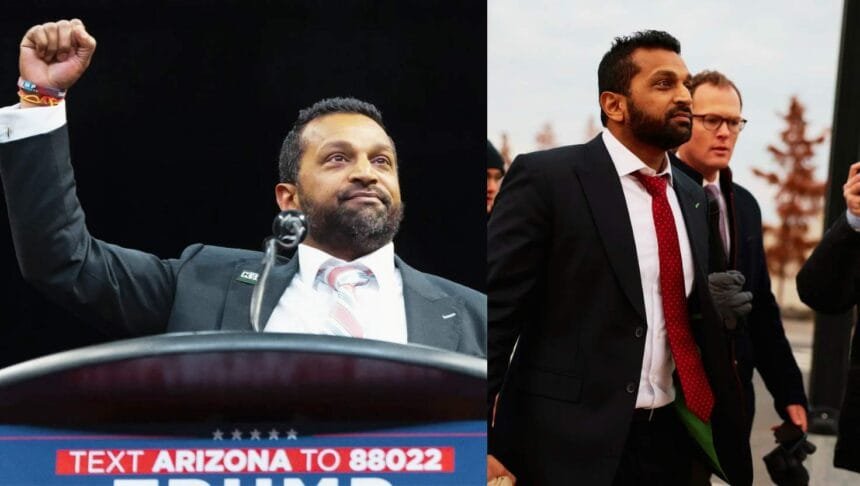President-elect Donald Trump stated that Kashyap “Kash” Patel will be the next director of the Federal Bureau of Investigation (FBI).
This has caused people to talk again about how politics are affecting federal law enforcement. Patel is a 44-year-old lawyer who is a staunch Trump supporter.
His strong opinions on the “deep state” and his plans to drastically change the FBI have earned him both praise and criticism.
The choice will test how determined Senate Republicans are and set the tone for Trump’s new government.
A Loyalist’s Rise
The path of Patel’s work shows how closely he agrees with Trump’s ideas. From his start as a public defender in Miami to his work in national security during Trump’s first term, Patel’s rise shows how much he supports the former president.
He first garnered Trump’s favor as a congressional staffer for Rep. Devin Nunes, where he played a key role in drafting a controversial memo criticizing the FBI’s surveillance practices during its Russia investigation.
While many of Patel’s claims were later debunked, his advocacy solidified his place as a staunch Trump ally.
Patel has worked as a chief of staff for Defense Secretary Chris Miller and as an adviser to the acting director of national intelligence.
Even though Patel has had many jobs, some people have doubts about his ability to lead the country’s top law enforcement body.
In his memoir, former Attorney General William Barr said that Patel “had virtually no experience that would qualify him to serve at the highest level” of the FBI.
The Agenda for Reform
Trump wants to change the FBI in a big way, and Patel’s selection fits with that. In the past, Patel has called for big changes to the structure of the government, such as getting rid of the data gathering arm of the bureau.
In an interview in September, Patel suggested that the FBI’s famous Hoover Building be closed and its 7,000 workers be sent out into the field to do more work. “Go be police.” You’re police. Go be cops,” he declared, reflecting his desire to refocus the bureau’s efforts on traditional law enforcement tasks.
Some people are worried about these kinds of plans because they think they try to weaken the FBI’s important intelligence work.
Patel’s words, like his promise to get rid of “anti-Trump” people from government agencies, have made people even more worried that the FBI could become too political under his leadership.
Patel wrote in his autobiography, Government Gangsters, that his job was to fight a “corrupt ruling class” that he says wants to destroy democracy.
Implications for the FBI’s Independence
The nomination of Patel marks a sharp departure from the traditional rules surrounding the FBI’s leadership. In the past, FBI heads were given 10-year terms to make sure the agency could work without being affected by politics.
Christopher Wray is the new director. He was hired by Trump in 2017, but the former president no longer likes him.
Wray’s tenure has seen contentious moments, including the FBI’s search of Trump’s Mar-a-Lago estate for classified papers and investigations into threats against school boards.
Trump’s choice to nominate Patel shows that he wants to have more power over federal law enforcement. Some people say that this could make people less trusting of the FBI’s fairness.
A senior law enforcement official who did not want to be named said, “This nomination goes against the very core of the FBI’s nonpartisan mission.”
Senate Confirmation Battle Ahead
Now Patel’s nomination goes to the Senate, where its fate is less clear. Trump has a lot of backing from Republican lawmakers, but Patel’s questionable past and divisive speech may make it harder for him to be confirmed.
Democrats are likely to vote against the nomination unanimously, noting worries about Patel’s lack of experience and belief in conspiracies.
Additionally, Senate Republicans may also be in a tough spot. They turned down Trump’s choice of Matt Gaetz for Attorney General earlier this year, which showed they were ready to fight some of the president-elect’s more controversial picks.
We don’t know if Patel will face the same kind of opposition.
Broader Political Ramifications
Trump’s overall plan to increase power in the executive office is shown by his choice of Patel. Trump wants to change the way the federal government works to fit his vision by putting loyalists in important roles.
People who are against politics and people who used to work for the government have harshly criticized this method and warned of the problems it could cause for democratic government.
In his defense, Patel says that he is a reformer who wants to restore trust in government organizations.
He has made a name for himself as a fighter against graft and a supporter of accountability through his book and public speaking.
But those who disagree with him say that his words only split an already divided country even more.



